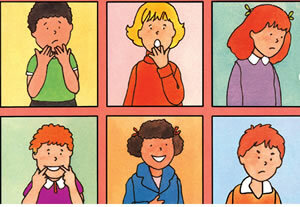Importance of Feelings
Miscellanea / / August 08, 2023

Title of Professor of Biology
Millions of stimuli are perceived daily by the body and the mental processing capacity for all of them would be incredibly taxing if it happened exclusively from consciously, hence the urgent need to delegate most of these functions to the underlying processes of the unconscious and subconscious, which store information filtering to us what could be strictly necessary, to then communicate it to us in more subtle ways, through a language of which we still do not have full knowledge and where We find expressions such as feelings, which are mainly responsible for: 1) the association of experiences with the positive or negative results that could have had; 2) the subtle evocation of memories for greater control of emotions; 3) the generation of the necessary elements for the development of empathy and understanding of external circumstances; 4) building affective ties; 5) guidance towards making decisions that give meaning to life; and 6) the base structure for the moral qualification between good and evil.
On the other hand, the lack of an adequate mechanism for the development and management of feelings represents a complex problem in the Being, which is exposed in a uncontrolled monitoring of emotional impulsiveness, which gives rise to a wide variety of mental illnesses with serious repercussions, both personal and social.
construction of society
The possibility of feeling life beyond the mere perception of the physical information that the environment offers us, being able to create for ourselves an internal dynamic of sensations, has been the result of a long evolutionary process in constant interaction between the needs for manifestation of feelings and the results generated as consequence.
The fact that humanity managed to establish itself as a gregarious species, through affective ties, allowed the creation of the family, through which to provide shelter and protection to the smallest, in order to guarantee the survival of the species, while in a second aspect, led to the possibility of creating increasingly productive and complex settlements and life models, the generation of roles for the fulfillment of the different responsibilities and finally the appearance of the growing communities that shaped the social capacity that so much development has represented us.
personal limits
 On a more intimate level, owning, acknowledging, and learning to negotiate with our own feelings becomes the powerful resource for establishing fulfilling relationships, but also to be able to maintain a prudent distance from those people or circumstances that may represent situations of risk, negative charges or experiential conditions toxic. Therefore, having a healthy balance between our feelings, dedicating ourselves to cultivating the positive ones, through satisfactory experiences and pleasant, helps us improve the quality of life in all its dimensions, in addition to keeping us away from the potential risks of scourges social.
On a more intimate level, owning, acknowledging, and learning to negotiate with our own feelings becomes the powerful resource for establishing fulfilling relationships, but also to be able to maintain a prudent distance from those people or circumstances that may represent situations of risk, negative charges or experiential conditions toxic. Therefore, having a healthy balance between our feelings, dedicating ourselves to cultivating the positive ones, through satisfactory experiences and pleasant, helps us improve the quality of life in all its dimensions, in addition to keeping us away from the potential risks of scourges social.
Conquer the world
The search for personal improvement, as well as the achievement of the objectives that we can set ourselves, is also a matter in which feelings they always stick their noses in, conditioning us from the unconscious towards the realization or not of the proposals that could appear in a certain moment. In this sense, the feelings that we have about our own abilities condition even the level of self-esteem that we have, influencing each of our actions, attitudes and decisions.
Cultivating positive feelings towards ourselves, then, becomes not only a benefit for the image that we can project towards others, but also a trigger powerful to dare to explore all the abilities and talents that we can keep suppressed by negative feelings such as shame, guilt, fear of making mistakes or even the certainty of feeling incapable of achieving something specific, which conditions us towards following a monotonous, limited, frustrating and mostly depressing, all factors that have a detrimental impact on one's own mental health, progressively disrupting physical health as well, and completely contrary to the true essence of life.
In other words
While in the case of animals we speak of sensations purely physical or related to impulse, in the case of human beings we speak of feelings, those expressions that are combination of both physical sensations and psychological and emotional constructions that a person performs before certain events. In this sense, we can point out that feelings are an important characteristic of human being since they mold and transform their personalityhis character, his self-esteem, his vision of the world in very different ways.
When we talk about feelings we refer to the different ways in which the body and the psyche or mind express themselves in certain situations. Thus, some of the most common feelings are joy, sadness, anger, patience, tranquility, anxiety. To a large extent, they are shown through different physical traits (for example, happiness through a smile or sadness with tears), in the same way that they are also represented on a psychological level, changing the state of mind, self-esteem, the security of a person.
It is understood that the importance of feelings lies in the fact that they are various forms through which the person demonstrates how different situations or vicissitudes affect his personality and his character. Thus, feelings are the phenomena that constitute us from the simplest to the most complex, such as unique individuals, capable of feeling many different things, and completely different, for example, from the machines. Feelings make a person differ from a rock since it, not being a living being, does not receive any kind of reaction to the change. Human feelings also place us much closer to our most intimate self, since it is the moment of greatest sentimentality that in which the stimuli arise and become clearly visible.
References
Hut Armenta, J. L. (2011). History of feelings. Thémata.
Fredrickson, B. L. (2004). The power of good feelings. Mind and Brain, 8, 74-78.
Marina, J. A., & Penas, M. L. (2000). Dictionary of feelings. Anagram.
Morales, m. S., & Cuenca, M. TO. (2003). Educating emotions and feelings: A practical introduction to the complex world of feelings (Vol. 165). Narcea Editions.
Pallares, M. (2010). Emotions and feelings. Marge books.
write a comment
Contribute with your comment to add value, correct or debate the topic.Privacy: a) your data will not be shared with anyone; b) your email will not be published; c) to avoid misuse, all messages are moderated.
